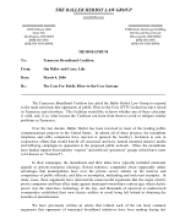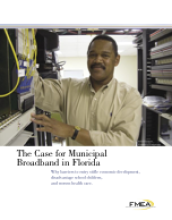A Study of the Economic and Community Benefits of Cedar Falls, Iowa's Municipal Telecommunications Network
Image

Doris Kelley takes a look at one of the early citywide publicly owned broadband systems - Cybernet in Cedar Falls, Iowa. Cybernet is run by CFU and is an HFC (cable) network that also offers some fiber-optic connections for businesses. In this paper, Kelley takes a look at some of the benefits the network has brought to the community.
From the start of the paper:
Cedar Falls Utilities, the largest municipally owned four-service utility in Iowa, provides electric, natural gas, water and communications services to a community of over 36,000 people. The citizens of Cedar Falls have been and continue to be the driving force behind Cedar Falls Utilities. Because of citizen demand and involvement, what once began as an unreliable water supply from “Big Springs,” a small light plant built with discarded bricks and an outdated manufactured gas system, has grown into an organization that is recognized nation-wide in the utility industry for outstanding performance management and some of the most favorable utility rates in the country. Cedar Falls Utilities (CFU) is a strong supporter of economic development. Through the years, the Cedar Falls community has directly benefited by the operation of its municipally owned utilities through direct customer rate savings, free or special customer service programs and fund transfers to the City’s general fund. CFU has made great strides to further its commitment to economic development. In 1994, a new horizon was encouraged through visionary thinking. Considerable strategic planning and analysis preceded the decision to design, construct and operate a Broadband Fiber Optic Communications System. The Cedar Falls Board of Trustees spent approximately 24 months studying the technical and financial feasibility of constructing and operating such a network. Finally, on October 24, 1994, the Cedar Falls City Council adopted ordinance No. 2072 forming the country’s second Municipal Communications Utility and transferring authority to the Cedar Falls Utilities Board of Trustees.



